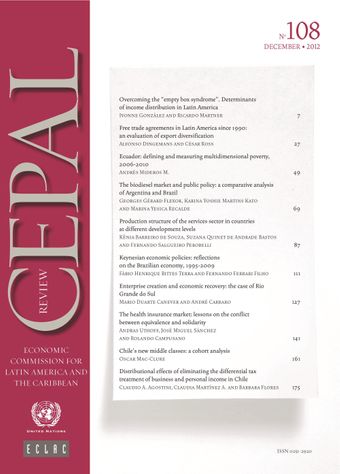-
Overcoming the “empty box syndrome”. Determinants of income distribution in Latin America
- Source: CEPAL Review, Volume 2012, Issue 108, Dec 2012, p. 7 - 25
- Spanish
-
- 27 Dec 2012
- Previous Article
- Table of Contents
- Next Article
Abstract
Latin America’s persistent inequality seem to reflect the lack of specific policies to reduce income disparities. The present study uses econometric techniques to estimate the determinants of the income distribution in the region, in a context in which economic growth seems to coexist with the reduction of inequalities — thereby overcoming the “empty box syndrome” that characterized the region in the 1980s and 1990s. Using cross-section studies of a sample of member countries of the Organization for Economic Cooperation and Development (OECD) and Latin America, along with panel estimations for 18 Latin American countries in the period 1990-2010, the article reveals the key role played by educational, institutional and macroeconomic variables in the recent improvements. It also identifies the importance of fiscal action, through variables such as social spending, expenditure on education, capital expenditure and an indicator of the progressiveness of the tax system.





